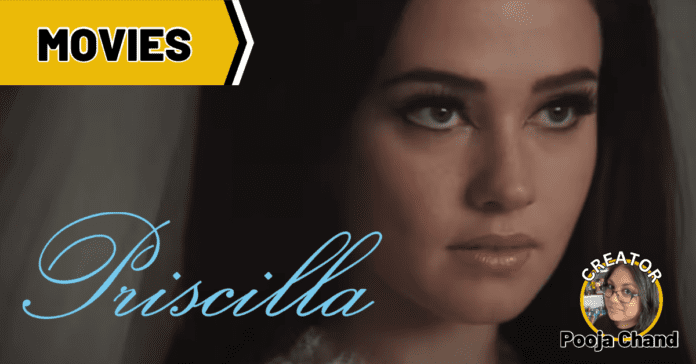Share this
With a24 on the rise and more films from the unique independent studio garnering attention, there is one that has been the subject of curiosity as well as scrutiny. Priscilla, directed by Sofia Coppola, follows the life experience of Priscilla Beaulieu from the moment she meets the legendary Elvis Presley to the time of their separation in marriage. The film stars Cailee Spaeny and Jacob Elordi as the iconic superstar couple whose story is far less sparkling than one would imagine.

If anything proves Sofia Coppola’s ability to take on a film like Priscilla, it’s her very particular filmography, featuring notable titles like The Virgin Suicides, Lost in Translation, and Marie Antoinette. Coppola has a knack for films that explore girlhood and womanhood as two separate concepts but acknowledge the frequency both melding into one another. And it is these precise themes that have worked their way into Priscilla, a film that dives deep into the dreamlike fantasy of a young girl before it gradually turns into a cautionary tale. The aesthetics presented in the film carry part of the weight in exposing Priscilla’s perspective throughout her years with Elvis, and as a woman, it’s almost impossible to not feel empathetic toward her.
The film’s story remains cohesive despite the various time jumps and small moments that open a window into Priscilla’s view of her relationship and eventual marriage. It’s also incredibly clear that the intent is to overshadow Elvis as much as possible with Priscilla, to strip away the layers of her emotions, and ultimately unveil the reality of her circumstances. Not only do we see her juvenile happiness and excitement in being handpicked by Elvis himself, but we see her descent into loneliness and jealousy within a relationship that was never suited for her in the first place. The depiction of the way Priscilla strives to live on her own terms over time despite the desired image she has been assigned to display each and every day is a testament to Sofia Coppola’s ability to appropriately showcase the life of a woman with grace but also pure honesty.

There is no denying that much of the tone and emotion is brought forth through the magnetic talents and chemistry between Cailee Spaeny and Jacob Elordi. Spaeny is absolutely stunning as Priscilla, particularly in the mannerisms and face cards that present her emotions louder than her words. She manages to transform as Priscilla from the age of 14 and straight into adulthood, portraying her alleged maturity while maintaining her childlike habits. Meanwhile, Elordi takes a backseat as Elvis, keeping his distance from the spotlight to keep the focus on Spaeny while still managing to present Elvis through Priscilla’s eyes in a “don’t meet your idols” type of way. It’s a rather thankful moment that neither Elvis’ accent nor his flashy nature comes across as distracting, keeping us in the zone of to whom this story belongs.

If you’re expecting a heartfelt romance between Priscilla and Elvis, or some secrets exposed, you may be disappointed. However, Priscilla is a film that takes on what it’s like to be young and to idolize a celebrity or mega star, and to be the one that catches their eye. Coppola does an exquisite job of ensuring that the nature of the relationship isn’t romanticized or overdone, and instead allows the audience to come to terms with who Elvis was through Priscilla’s eyes while exploring the rise of hopes and the crushing of dreams. Priscilla is ultimately the depiction of a celebrity fantasy gone wrong, and the moments that forced a woman to shed an image of herself that wasn’t hers to begin with.
Samosa Rating:
Priscilla receives 4.5 out of 5 Samosas.
Priscilla is now playing in theaters.
Runtime: 1hr 50m
If you want even more film discussions, reviews, or just some good old recommendations, be sure to follow @samosasandpopcorn on TikTok!

